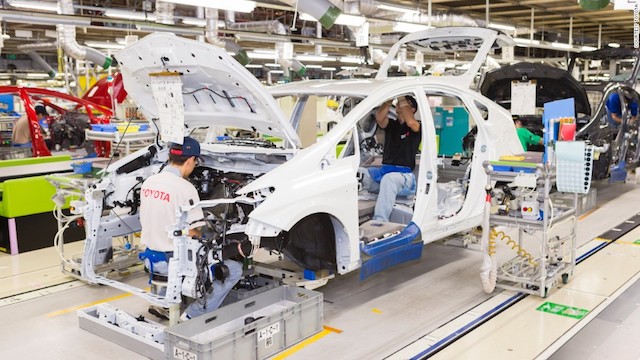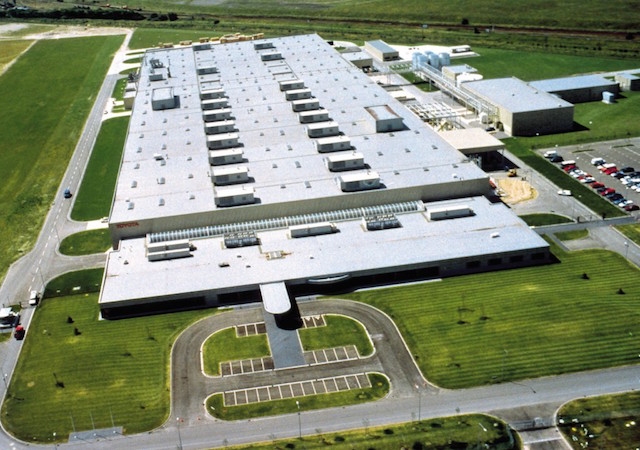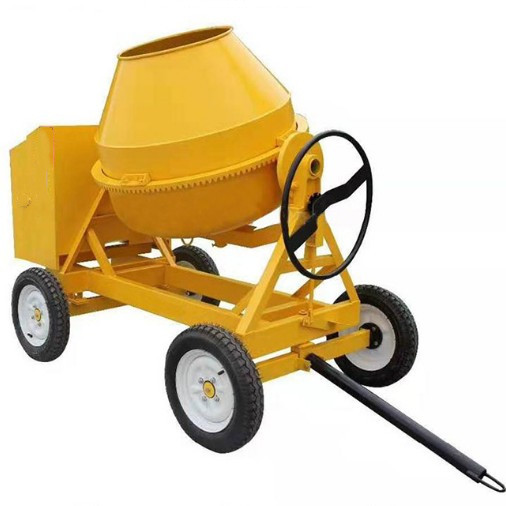Concrete Mixer is a kind of multifunctional machinery which combines the transit mixer, concrete mixer and Wheel Loader together. It can automatically load, measure, mix and discharge concrete mixture. the self loading concrete mixer is just like a truck and the operator can drive it to where it needs to go. It is very convenient for loading material, such as cement, aggregate, stone. The mixing unit is slewing hydraulically through 290° for high discharge over 2 m on the four sides of the vehicle. Used Concrete Mixer Truck,Concrete Mixer Truck,Cement Mixer,Mini Mixer Truck Shandong Nuoman Engineering Machinery Co., Ltd , https://www.chinanuoman.com Despite excess capacity, Toyota rarely closes factories.
Despite excess capacity, Toyota rarely closes factories. Toyota Values Human Capital
“Because people make our automobiles, nothing gets started until we train and educate our people.†These words from Eiji Toyoda reflect a core belief at Toyota. This philosophy is deeply embedded in the company culture. During the 2008 economic downturn, when truck sales dropped by nearly 50%, Toyota chose not to lay off workers at its San Antonio plant. Instead, they kept all 2,000 employees on full payroll, even if they weren’t producing cars.
“They will continue to report to work and be paid 100% of their wages,†said Mike de la Garza, a Toyota spokesperson at the time. While the workers weren’t building trucks, they used their time for training, skill development, and even community service. Toyota believed that investing in its people was more valuable than cutting costs short-term.
Toyota Tolerates Excess Capacity
 This principle ties back to Toyota’s long-term vision. In an ideal world, every factory would operate at full capacity. But the real world is unpredictable. Sales fluctuate, and demand can dip unexpectedly. Rather than closing plants during these times, Toyota prefers to maintain operations and invest in its workforce.
During the Great Recession, while many automakers slashed production, Toyota kept its U.S. factories open. They prioritized stability over short-term savings, believing that maintaining a skilled workforce would pay off in the future. By keeping plants running—even with lower output—Toyota ensured readiness for the next upturn in demand.
This principle ties back to Toyota’s long-term vision. In an ideal world, every factory would operate at full capacity. But the real world is unpredictable. Sales fluctuate, and demand can dip unexpectedly. Rather than closing plants during these times, Toyota prefers to maintain operations and invest in its workforce.
During the Great Recession, while many automakers slashed production, Toyota kept its U.S. factories open. They prioritized stability over short-term savings, believing that maintaining a skilled workforce would pay off in the future. By keeping plants running—even with lower output—Toyota ensured readiness for the next upturn in demand.
Toyota Builds Where They Sell
The 2008 crisis taught Toyota a valuable lesson: to stay competitive, it needed to produce closer to where its customers lived. This led to a shift toward a “build where you sell†strategy. Instead of relying heavily on Japanese manufacturing, Toyota began expanding production in key markets like North America and China.
For example, Toyota announced a new plant in Mexico to serve the growing North American market and another in China to tap into its vast consumer base. These projects come with high costs, but they offer long-term benefits by reducing currency risks and improving local responsiveness.
Additionally, Toyota has been working to increase the autonomy of its international divisions. In the U.S., for instance, the company is upgrading its Kentucky plant and building a new headquarters in Texas. This decentralization helps Toyota better adapt to regional needs and market changes.
In summary, Toyota keeps its factories open because it values long-term growth over quick fixes. It builds only where there's a sustainable future and avoids shutting down plants due to temporary setbacks. This approach has helped Toyota remain resilient through economic ups and downs.
The wide cabin windscreen and the specially designed loading arms dramatically improve visibility during casting operations. This high-productivity self loading concrete mixer easy to use, features excellent daily performance and reliability. Thanks to these characteristics, it is the ideal solution for rental purposes and for maintenance operations.